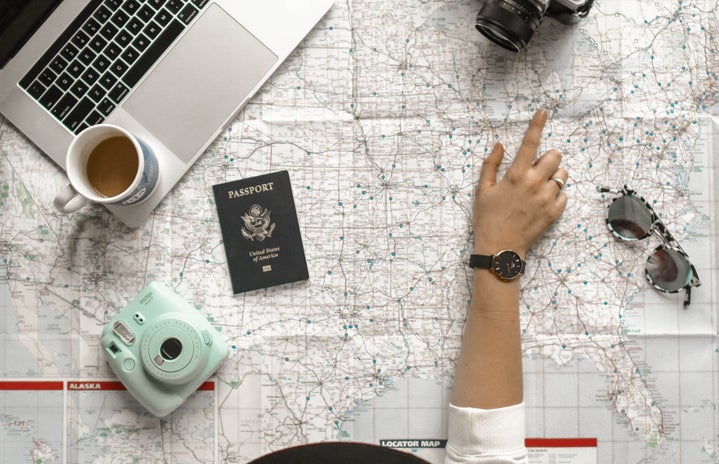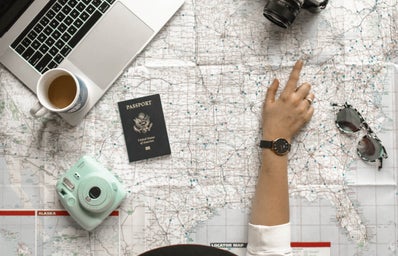It starts with an idea. Fantastic dreams of unknown opportunities that will open the door to a great future career. And then there’s the choice. You graduate from school and the world seems like an open door. “What should I study and where should I study,” are the questions you may ask yourself. Most of us feel the pressure, the craving, almost the need for a change. The urge to escape the bubble of familiarity and gain new experiences. This desire for independence drives many of us. And then the world seems so open, unexplored and interesting.
This is what encouraged me to study abroad.
I decided to gather my courage and apply to study at the University of King’s College here in Halifax, at which point, the so-called “brand new chapter in my life” began. But living abroad is not a fantastical dream that is always sold in books, movies and even the media. It comes with its fair share of heartaches. There are ups and downs, and even the ups are not quite the way you might have imagined. Here are some thoughts and experiences I’ve gathered since I moved from Poland to Canada three years ago. These are my personal experiences, and while I believe everyone has their unique perspective on what it’s like to be an international student, I think some of them can be helpful in preparing for a life abroad.
- Feeling in-between places: Since I got used to living in Halifax, I’ve noticed a feeling of strangeness every time I come back home. Getting accustomed to a new place is not the same as feeling fully part of it. I’ve lived in Canada for almost three years now, and while Halifax is now a familiar place, it hasn’t made me Canadian. On the other hand, whenever I come home, no matter how much I miss it, I notice all the little changes around me, like the disappearance of buildings or the rebranding of the cafe where I used to drop by for pastries into a grocery store. This is also accompanied by a particular feeling that I can’t shake whenever I land in Warsaw. This feeling gets to me when my dad picks me up from the airport and we drive through the city where I’ve spent most of my life. This feeling that I don’t belong there anymore. That I’m not part of it like I used to be. It is painful.
Moving abroad means you are a stranger in a new country, a tourist at home; it’s not easy. That said, being an outsider also means you’re interesting everywhere. When I’m in Canada, I can bring stories from home as they are part of who I am. Back home, I can paint a picture of my new life abroad. These endless stories are always interesting because both are part of me. New and familiar experiences also broaden the definition of what makes me…well, me. And, that’s truly enriching.
- Rediscovering the familiar: Living away from home is getting to appreciate home from a different perspective. I have never noticed before how lush the green is in Polish forests during springtime. Or, how sunny downtown Warsaw makes so many people come out to the numerous little restaurants on the sidewalks or sit down with a drink by the Vistula river. Or, how wonderfully flowers bloom on the trees of Saska Kępa in May and how the birds sing a song so beautiful to me. All this is something I can see from a new perspective. All these details help me fall in love again and again with my home every time I’m back. Being a tourist in your own country has benefits as you get to fall in love with your home every time you return.
- Standing out: Sometimes when you come from a different place than most, you feel like you stand out. You can’t talk about what it’s like to play on the school hockey team. You don’t recognize the music that everyone sings at the party. You don’t get the joke. These situations can make you feel like you don’t belong. It’s normal. In times like these, it’s good to have people you can talk to about it. I like to share my experiences with other people. Sometimes being different makes people curious about your story because it stands out from the familiar. In my experience, people are always interested in what’s new. You can use that interest to meet new people and maybe you’ll learn something from them too.
- Loneliness: It can be overwhelming at times. There are moments when you feel so far from everything that seems familiar and it can take a toll on your mental health. Sometimes, the feeling of loneliness is associated with homesickness. The truth is that even if you get used to a new place, there will be times when you’ll still miss your family and home. This feeling won’t go away. From time to time, you might find yourself craving to be back home. This longing for familiar places, culture, and sometimes even language can be very painful. Suddenly, everything feels more foreign and strange. Missing home is also longing for carefree times. Longing for what is familiar. Longing for the former safety bubble. It is also a longing for family dinners and hanging out with friends from school. It’s missing the sight of colorful cafes and shops where everyone knows your name. It’s the familiar streets where you learned to rollerblade. It’s the smells and flavors from childhood. It’s the way the air around you just smells different. These thoughts appear frequently and heighten the feeling of being far from everything familiar. Truth is, we tend to idealize the things that belong to a familiar past because we find comfort in them. It’s also natural to miss something or someone you love deeply. My best remedy for this bittersweet melancholy is to bring elements associated with home into my new life. Then, I not only feel close to home but also to my family. If you miss home, bring a piece of home with you.
- Homesickness: When you miss home, find little ways to bring it with you and make your new place feel more familiar. My way of coping with the heartache of being away from home is doing little activities that make me feel closer to home. Movies, music, cooking is how I bring home to Halifax. I play my favorite Polish songs, cook traditional dishes from my mom’s kitchen and watch my beloved European movies. These small activities related to my culture help me adapt to a new environment. It helps me bring a piece of home with me and make me feel more at home abroad.
- The friendships: The best way to feel at home abroad is to find the right people. It’s the friendships I formed that made me feel less lonely. It’s important to find the people that you can talk to and share your experiences with. Someone who makes cultural differences seem less significant. Making friends abroad allows you to connect with people from all over the world. Everyone brings an interesting story and you can feel connected to people through the shared experience of studying. It is during your studies that you have the opportunity to meet the most interesting people in your life. That’s how I met my closest friends. It is among good friends that you can feel at home when you live abroad. Cultural differences can be a source of bonding. Learning about each other’s cultures is a perfect way to share your passions with friends.
- The independence: The closer you get to adulthood, the more you want something new. You want to find out if you can make it by yourself. When I came to Canada, I didn’t know anyone and no one knew about me. And it felt good. It felt freeing. I could truly start my college life without the feeling that my past would affect people’s perception of me. I could redefine myself and choose how I wanted to be seen by others. I could also choose the people I wanted to be friends with, without the pressure of spending time with people I knew from school. A blank page. A clean slate. It’s refreshing.
- The adventure: Discovering a new culture, exploring a new territory, talking to people with experiences so different from yours is captivating. Living abroad makes every day an adventure. It makes the day-to-day so interesting because you always get to explore a new place, meet new people while being completely immersed in this different culture, which makes it exciting. It also enriches your perspective on the world like nothing else. A real way to broaden your horizons.
Even though living abroad can be difficult, it is truly a great adventure. But most importantly, it is the best opportunity to truly get to know yourself.


